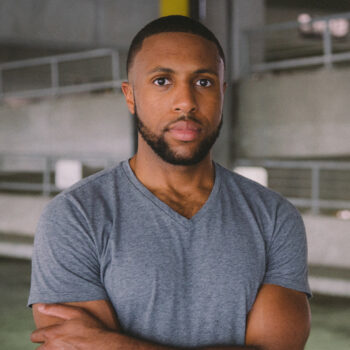I’d never really seen myself as particularly attractive. I was more artistic than athletic, and despite the hours of training I committed to dance, my body was just something I was never comfortable with. My wrists were too small, my arms were too long, my body looked weak. This, combined with the naturally feminine mannerisms I’d developed growing up, had become my greatest source of insecurity and what I would consistently blame for my anxiety and depression. I didn’t like what I saw, so why should anyone else? Who would believe that I was worthy of love and belonging?
A few weeks into my new job, I took to the gym. I was determined to get the body I wanted. One that I could be proud of that wouldn’t make me question my ability to do the things a man should be able to do. I had managed to start this process with friends once or twice in college, but I never made any progress. The commitment would hold for a month or so until I got busy, and then one off day quickly turned into two off weeks. If I were able to resist that pitfall then I would surely fall into the trap of comparison. As I would sit in the weight room of the recreation center, I’d watch as the guys around me would make things seem effortless. They would lift twice the amount I was lifting, three times as long as I could lift it while I looked at myself in the mirror with an expression that could only be read as “ain’t that bout a b*tch.”
The gym had never been my safe space. On the contrary, it was the place where I would watch enviously as people who had been working out for years demonstrated their own expertise, all the while I played a track in my head on a loop: Why are you here? You don’t know what you’re doing? They’re watching you. They know you don’t belong here. These were the times that I turned to Joe, a friend from home, whose carefree nature meant that he navigated the world with reckless abandon, completely uncaring about the opinions of others. Joe had recently joined the military but was familiar with the tantrums I would throw in the gym from the time he trained me for all of two weeks. Joe’s unique brand of motivation was something I would turn to when I felt discouraged. He was frank, honest, and didn’t take my shit, which in my world was impressive. Our friendship had always been one where we could lean on each other at the best and worst times.
So now, as I struggled with insecurity in between workouts, I texted out my frustrations.
Me: “I can’t do it.”
Joe: “Do what?”
Me: “Come to the gym. I can’t do half of what everybody else can do.”
Joe: “Screw ‘em. It’s not about them.”
That was the first of many times Joe would shut down my self-doubt with his unique brand of emotional support. But I held on to that sentiment:


















JOIN THE CONVERSATION